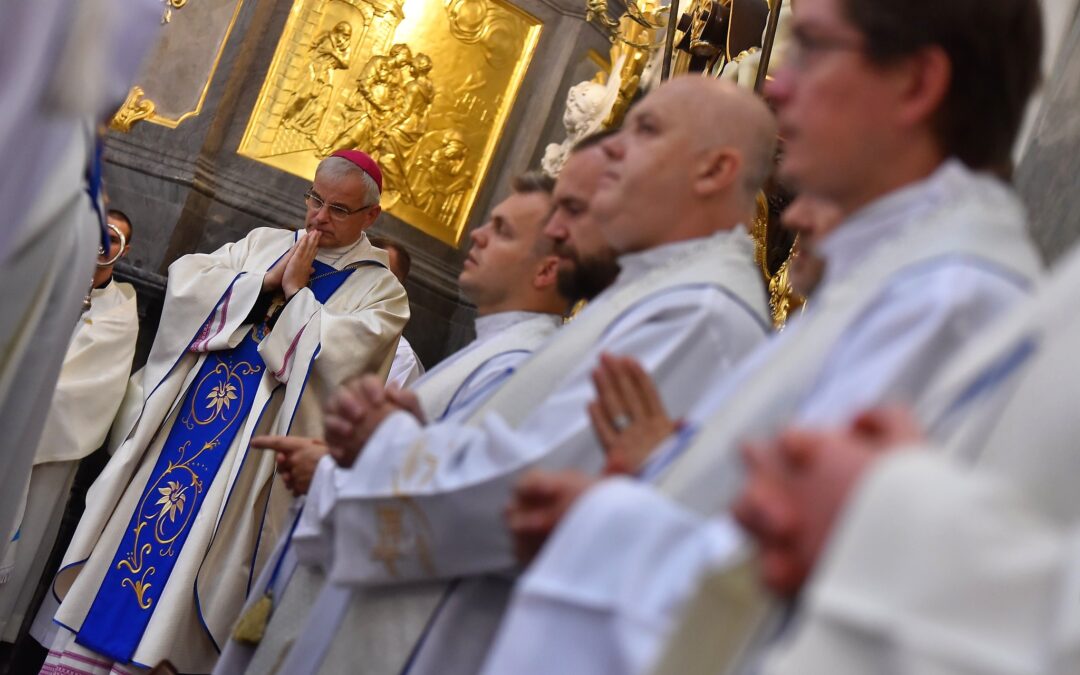The diocese of Kielce is to become the latest in Poland’s Catholic church to allow both single and married men to be ordained as deacons, meaning they can proclaim the gospel, lead the faithful in prayer, and conduct baptisms, marriages and funerals.
The diaconate is not a new form of service in the Catholic church in Poland. However, official statistics show that the number of deacons is now growing rapidly. That development comes as the number of newly ordained priests and students joining seminaries has been falling.
“In response to encouragement from the Holy Father Francis, we would like to launch preparation…for men to join the permanent diaconate,” announced the bishop of Kielce, Jan Piotrwoski. Pope Francis last year called deacons “guardians of service in the Church”.
Deaconhood is open to both married men – who must be over 35 years of age and have been married for at least five years – and unmarried men – who are only required to be over 25 but cannot marry once they are ordained. The candidates are also required to have an “unblemished reputation”.
To apply they need to have graduated from theological studies. Once they become deacons, they are able to participate in a range of roles relating to preaching, teaching and leading services. The diaconate is, however, like the priesthood, closed to women in the Catholic church.
The permanent diaconate was introduced two decades ago in Poland. However, it was not until 2008 that the first deacon was ordained, and only in recent years have significant numbers joined.
Of 87 serving deacons in Poland, 30 were ordained this year alone, the Polish episcopate told Notes from Poland. As recently as 2019 there were only 30 deacons in total, but “more and more men in Poland are entering the service of permanent deacon”, says the episcopate.
Only nine out of the current serving deacons are celibate, with the remaining 76 being married with families and other jobs, doing pastoral work in addition to their other responsibilities.
The growing number of deacons has come amid a falling number of students joining seminaries to train as priests. However, a spokesman for Kielce curia told Gazeta Wyborcza that their decision to introduce deacons “had nothing to do with the decline in the numbers of applicants to seminaries”.
“The bishop has been considering reestablishing [deaconhood] for a number of years now” and is not “searching for some reserves” to replace priests, he added.
According to state research agency CBOS, in the last 20 years the number of candidates for the priesthood in Poland has decreased by 60%. Some seminaries struggle to attract enough students to continue operating.
Last week, the Catholic Information Agency (KAI) reported that only one candidate applied to the seminary in the city of Łowicz, where only seven others are already studying. As a result, they were transferred to another seminary in Warsaw. The seminaries in Kalisz and Bydgoszcz were also recently closed.
Main image credit: EpiskopatNews/Flickr (under CC BY-NC-SA 2.0)

Agnieszka Wądołowska is deputy editor-in-chief of Notes from Poland. She is a member of the European Press Prize’s preparatory committee. She was 2022 Fellow at the Entrepreneurial Journalism Creators Program at City University of New York. In 2024, she graduated from the Advanced Leadership Programme for Top Talents at the Center for Leadership. She has previously contributed to Gazeta Wyborcza, Wysokie Obcasy and Duży Format.




















